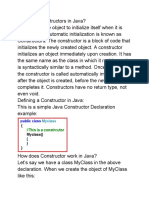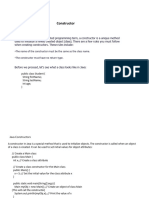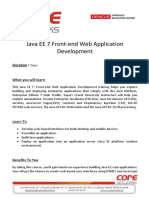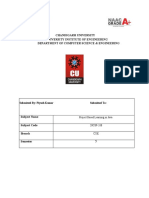0% found this document useful (0 votes)
24 views7 pagesRemaining OOP's Concepts
The document discusses object-oriented programming concepts like object instantiation, initialization, constructors, this keyword, encapsulation, data abstraction, and polymorphism. It provides examples of parameterized and non-parameterized constructors, using the this keyword to call constructors, encapsulation by hiding implementation details, and method overloading.
Uploaded by
Rahul NCopyright
© © All Rights Reserved
We take content rights seriously. If you suspect this is your content, claim it here.
Available Formats
Download as DOCX, PDF, TXT or read online on Scribd
0% found this document useful (0 votes)
24 views7 pagesRemaining OOP's Concepts
The document discusses object-oriented programming concepts like object instantiation, initialization, constructors, this keyword, encapsulation, data abstraction, and polymorphism. It provides examples of parameterized and non-parameterized constructors, using the this keyword to call constructors, encapsulation by hiding implementation details, and method overloading.
Uploaded by
Rahul NCopyright
© © All Rights Reserved
We take content rights seriously. If you suspect this is your content, claim it here.
Available Formats
Download as DOCX, PDF, TXT or read online on Scribd
/ 7




























































































